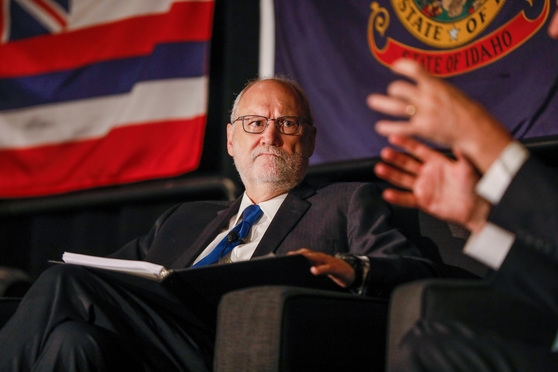Committee Revamps Federal Judicial Clerk Hiring Process During COVID-19
The Ad-Hoc Committee on Law Clerk Hiring, which includes Ninth Circuit Chief Judge Sidney Thomas, called on judges to modify hiring practices to limit exposure to the virus and circumvent travel issues for candidates.
April 30, 2020 at 01:30 PM
6 minute read
The original version of this story was published on Law.com
 Chief Judge Sidney Thomas, United States Court of Appeal for the Ninth Circuit. (Photo: Jason Doiy/ALM)
Chief Judge Sidney Thomas, United States Court of Appeal for the Ninth Circuit. (Photo: Jason Doiy/ALM)
The federal clerk hiring process, like so many other things, will get a COVID-19 remodeling this summer.
Federal judges have been encouraged to ditch paper applications and interview clerk candidates only by phone or video—negating the need for hot prospects to crisscross the country on last-minute flights to meet with judges in person.
The Ad-Hoc Committee on Law Clerk Hiring, which was created in 2018 and is composed of the three chief judges of federal circuit courts plus Judge Merrick Garland of the U.S. Court of Appeals for the District of Columbia, this month released a letter to all federal judges reiterating that the latest version of the Law Clerk Hiring Plan remains in effect during the coronavirus pandemic but that judges should modify their hiring process to limit exposure to the virus and circumvent travel issues for candidates. The clerk hiring plan, which is heading into its second year, seeks to make the clerk hiring process more uniform and transparent by establishing national dates for judges to receive applications, conduct interviews and extend offers. It also pushes clerk hiring back until the end of students' second year of law school.
"We know how difficult the current period is for students and judges alike, as well as for all of those assisting in the clerkship hiring process," reads the April 17 letter from the committee. The committee members are Garland, the former chief judge of the DC Circuit; Chief Judge Robert Katzmann of the U.S. Court of Appeals for the Second Circuit; Chief Judge Sidney Thomas of the U.S. Court of Appeals for the Ninth Circuit; and Chief Judge Diane Wood of the U.S. Court of Appeals for the Seventh Circuit.
"Given that the crisis is of uncertain duration, it makes sense to adhere to the application and hiring schedule as planned, with the practical safeguards of online applications and video interviewing."
Modifying the way clerks are hired is one of many changes the federal courts have had to make amid the coronavirus outbreak. Courthouses across the country have been shuttered and many courts, including the U.S. Supreme Court starting in May, are holding arguments over the phone or via video.
Ruth Payne, senior director for judicial clerkships at the University of Virginia School of Law, said Thursday that the committee's suggested changes are welcome news for law students hoping to land a clerkship this summer.
"I am pleased that judges are considering the possibility of remote interviews this year," she said. "Students are being affected in very different ways by the coronavirus. Some will not feel it is safe to travel, either because it would create risks for themselves or for loved ones. Remote interviewing, even if it sacrifices something, makes this a fairer, more open process."
Interviewing with judges by phone or online will also be a cost-saver for students, since they pay for those travel expenses themselves, noted Lois Casaleggi, associate dean for career services at the University of Chicago Law School.
"In addition, without having to travel for the interviews, there will be far less disruption to their summer employment and, for some students, caregiving obligations," she said. "I certainly understand the benefits of in-person interviews, but this solution presents some significant benefits for students as well."
The committee is urging all federal judges to use OSCAR—the federal judiciary's online clerkship application program—to eliminate the handling of paper applications and the virus transmission risks that come with it. And OSCAR is a key component to the long-term success of the hiring plan, because it allows the judiciary to control when judges receive applications from clerk hopefuls and makes it more complicated for judges to jump the gun on hiring.
The current clerk hiring plan, which debuted last summer, is only the latest in a line of attempts to bring order to the traditionally chaotic world of federal law clerk hiring. Previous attempts enjoyed early success but broke down in subsequent years as more judges hired clerks in advance of the plan's established dates.
Under the current plan, participating judges wait until the summer after a law student's second year to make hiring decisions. That timing is meant to ensure judges have two full years of grades to consider and that students who don't have lawyer parents or other early connections to the industry have time to learn about clerkships and position themselves to secure one.
This year, OSCAR will release applications to judges on June 15. Judges will then have a 24-hour period in which to review applications—a modification added this year—and may start interviewing candidates on June 16. They must hold offers open for 48 hours to allow students to interview with other judges. The committee will reevaluate the pilot plan at the end of the 2020 clerk hiring cycle.
But the first round of the plan generally earned praise from judges and law schools. The deans of 11 top law schools wrote an open letter to federal judges in January, imploring more of them to participate in the clerk hiring plan on the grounds that waiting until after the second year of law school to hire levels the playing field somewhat for students.
It's unclear how many judges followed the pilot plan in its first year or how many will do so this year. Garland said in January that almost every judge who participated in 2019 plans to do so this summer, but participation is voluntary. It remains to be seen whether the added hiring complications from COVID-19 prompt more judges to get on board with the plan or whether the new limitations will give rise to more judges seeking an advantage by hiring early.
This content has been archived. It is available through our partners, LexisNexis® and Bloomberg Law.
To view this content, please continue to their sites.
Not a Lexis Subscriber?
Subscribe Now
Not a Bloomberg Law Subscriber?
Subscribe Now
NOT FOR REPRINT
© 2025 ALM Global, LLC, All Rights Reserved. Request academic re-use from www.copyright.com. All other uses, submit a request to [email protected]. For more information visit Asset & Logo Licensing.
You Might Like
View All
Latham Adds Former Treasury Department Lawyer for Cross-Border Deal Guidance
2 minute read
Zoom Faces Intellectual Property Suit Over AI-Based Augmented Video Conferencing
3 minute read
'A Warning Shot to Board Rooms': DOJ Decision to Fight $14B Tech Merger May Be Bad Omen for Industry
Trending Stories
Who Got The Work
J. Brugh Lower of Gibbons has entered an appearance for industrial equipment supplier Devco Corporation in a pending trademark infringement lawsuit. The suit, accusing the defendant of selling knock-off Graco products, was filed Dec. 18 in New Jersey District Court by Rivkin Radler on behalf of Graco Inc. and Graco Minnesota. The case, assigned to U.S. District Judge Zahid N. Quraishi, is 3:24-cv-11294, Graco Inc. et al v. Devco Corporation.
Who Got The Work
Rebecca Maller-Stein and Kent A. Yalowitz of Arnold & Porter Kaye Scholer have entered their appearances for Hanaco Venture Capital and its executives, Lior Prosor and David Frankel, in a pending securities lawsuit. The action, filed on Dec. 24 in New York Southern District Court by Zell, Aron & Co. on behalf of Goldeneye Advisors, accuses the defendants of negligently and fraudulently managing the plaintiff's $1 million investment. The case, assigned to U.S. District Judge Vernon S. Broderick, is 1:24-cv-09918, Goldeneye Advisors, LLC v. Hanaco Venture Capital, Ltd. et al.
Who Got The Work
Attorneys from A&O Shearman has stepped in as defense counsel for Toronto-Dominion Bank and other defendants in a pending securities class action. The suit, filed Dec. 11 in New York Southern District Court by Bleichmar Fonti & Auld, accuses the defendants of concealing the bank's 'pervasive' deficiencies in regards to its compliance with the Bank Secrecy Act and the quality of its anti-money laundering controls. The case, assigned to U.S. District Judge Arun Subramanian, is 1:24-cv-09445, Gonzalez v. The Toronto-Dominion Bank et al.
Who Got The Work
Crown Castle International, a Pennsylvania company providing shared communications infrastructure, has turned to Luke D. Wolf of Gordon Rees Scully Mansukhani to fend off a pending breach-of-contract lawsuit. The court action, filed Nov. 25 in Michigan Eastern District Court by Hooper Hathaway PC on behalf of The Town Residences LLC, accuses Crown Castle of failing to transfer approximately $30,000 in utility payments from T-Mobile in breach of a roof-top lease and assignment agreement. The case, assigned to U.S. District Judge Susan K. Declercq, is 2:24-cv-13131, The Town Residences LLC v. T-Mobile US, Inc. et al.
Who Got The Work
Wilfred P. Coronato and Daniel M. Schwartz of McCarter & English have stepped in as defense counsel to Electrolux Home Products Inc. in a pending product liability lawsuit. The court action, filed Nov. 26 in New York Eastern District Court by Poulos Lopiccolo PC and Nagel Rice LLP on behalf of David Stern, alleges that the defendant's refrigerators’ drawers and shelving repeatedly break and fall apart within months after purchase. The case, assigned to U.S. District Judge Joan M. Azrack, is 2:24-cv-08204, Stern v. Electrolux Home Products, Inc.
Featured Firms
Law Offices of Gary Martin Hays & Associates, P.C.
(470) 294-1674
Law Offices of Mark E. Salomone
(857) 444-6468
Smith & Hassler
(713) 739-1250







